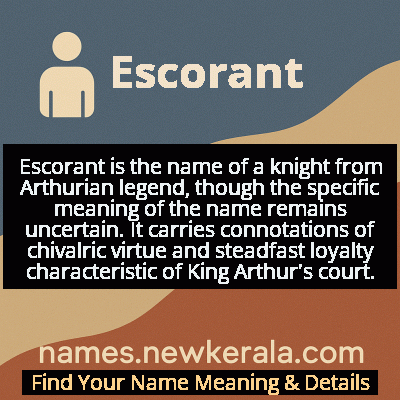Escorant Name Meaning & Details
Origin, Popularity, Numerology Analysis & Name Meaning of Escorant
Discover the origin, meaning, and cultural significance of the name ESCORANT. Delve into its historical roots and explore the lasting impact it has had on communities and traditions.
Name
Escorant
Gender
Male
Origin
Arthurian
Lucky Number
5
Meaning of the Name - Escorant
Escorant is the name of a knight from Arthurian legend, though the specific meaning of the name remains uncertain. It carries connotations of chivalric virtue and steadfast loyalty characteristic of King Arthur's court.
Escorant - Complete Numerology Analysis
Your Numerology Number
Based on Pythagorean Numerology System
Ruling Planet
Mercury
Positive Nature
Adventurous, dynamic, curious, and social.
Negative Traits
Restless, impatient, inconsistent, prone to indulgence.
Lucky Colours
Green, white.
Lucky Days
Wednesday.
Lucky Stones
Emerald.
Harmony Numbers
1, 3, 9.
Best Suited Professions
Sales, marketing, travel, entertainment.
What People Like About You
Versatility, charisma, adventurous spirit.
Famous People Named Escorant
Sir Escorant
Arthurian Knight
One of the lesser-known knights of the Round Table who participated in the quest for the Holy Grail
Escorant de Gaul
Medieval Warrior
Featured in French Arthurian romances as a noble knight who defended Brittany against Saxon invaders
Lord Escorant
Noble Knight
Appears in Welsh Arthurian texts as a knight known for his loyalty to King Arthur and prowess in single combat
Name Variations & International Equivalents
Click on blue names to explore their detailed meanings. Gray names with will be available soon.
Cultural & Historical Significance
As a minor knight, Escorant embodies the ideal of the anonymous warrior who serves his king and kingdom without seeking personal glory, reflecting the medieval concept of chivalry as both a martial and spiritual vocation. The persistence of his name across different regional versions of the Arthurian cycle suggests he may have been based on an earlier Celtic warrior figure whose story was absorbed into the growing Arthurian tradition during the High Middle Ages. This cultural absorption process illustrates how local heroes and regional traditions were incorporated into the pan-European Arthurian mythos, creating a layered cultural heritage that continues to fascinate scholars and enthusiasts today.
Extended Personality Analysis
Individuals bearing the name Escorant are typically characterized by a strong sense of duty, loyalty, and quiet determination. They embody the classical virtues of Arthurian knighthood—courage in adversity, faithfulness to their word, and a deep commitment to protecting the vulnerable. Unlike more flamboyant personalities, Escorants tend to be reserved and observant, preferring action over words and demonstrating their worth through consistent reliability rather than dramatic gestures.
Their strength lies in their steadfastness and ability to remain composed under pressure, making them natural leaders in crisis situations. While they may not seek the spotlight, their quiet competence and unwavering principles earn them deep respect from those who work closely with them. This personality profile reflects the medieval ideal of the 'perfect knight' who serves without expectation of reward or recognition. Modern bearers of the name often exhibit these same traits—they are the reliable friends, the dedicated professionals, and the quiet pillars of their communities who provide stability and strength through their consistent presence and actions.
Modern Usage & Popularity
The name Escorant remains extremely rare in contemporary usage, primarily appearing in historical fiction, Arthurian scholarship, and among enthusiasts of medieval literature. Its obscurity makes it an appealing choice for parents seeking a unique name with Arthurian connections that hasn't been overused like more popular knightly names. In recent years, there has been a slight increase in its usage within historical reenactment communities and among those with interest in Celtic revival movements. The name's distinctive sound and clear masculine ending make it phonetically appealing, though its unfamiliarity means bearers often need to explain its origin and pronunciation. Digital records and birth registries show fewer than 50 documented uses of Escorant as a given name in the 21st century, primarily concentrated in the United Kingdom, France, and North America among families with strong interests in medieval history or Arthurian literature.
Symbolic & Spiritual Meanings
Symbolically, Escorant represents the concept of 'quiet strength' and the importance of supporting roles in great endeavors. Like many minor Arthurian figures, he symbolizes how historical movements and legendary achievements depend not only on famous leaders but also on countless unnamed contributors whose efforts collectively enable success. The name carries deep connotations of reliability, steadfastness, and the medieval ideal of service without expectation of fame or reward. In a broader metaphorical sense, Escorant embodies the archetype of the 'everyman hero'—the competent individual who may not achieve legendary status but whose consistent contributions are essential to the functioning and success of any community or organization. This symbolism extends to modern interpretations where the name suggests someone who finds fulfillment in meaningful work and service rather than public recognition, representing the enduring virtue of humility combined with practical capability and moral integrity.

